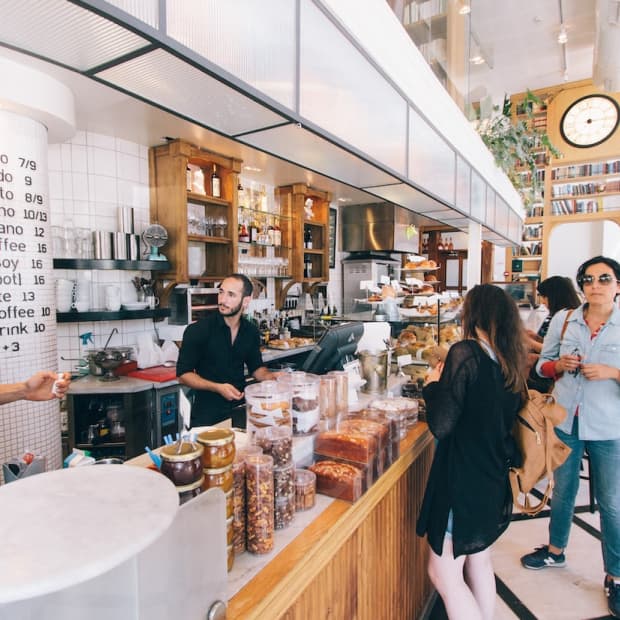
Consulting for an NFT marketplace in restaurant business
- Home
- Success stories
- Consulting for an NFT marketplace in restaurant business
About the client
Oku Group is a food and beverage technology company. It is determined to redefine the way people experience food and to empower restaurants, food retailers, and F&B brands to unleash novel opportunities and acquire a better understanding of their operations and finances.Details
- Location:Singapore
- Year:2022
Project goals
- 1
Help the customer define the core technical components and architecture of the NFT marketplace-to-be
- 2
Elaborate on how to ensure smooth user flow on the platform
- 3
Research and provide a list of key third-party integrations
- 4
Consult the customer on the most appropriate technology stack
- 5
Think through the key NFT marketplace features
Work done
- Comprehensive vision and scope document outlining the solution’s core components and architecture
- In-depth business analysis of the customer’s future NFT marketplace
- Research into the most suitable third-party integrations for providing the user with an impeccable experience
- Definition of potential business and technical risks
- Elaboration of the NFT marketplace structure and operational logic
- Conceptualization of the marketplace’s core features and NFT model
Business opportunity
An expert in the field, our customer conducted thorough market research and concluded that the existing methods for restaurant financing are inefficient and suboptimal for both owners and investors. The client also noted that restaurants often have to operate with tight margins and limited working capital, which puts them in a difficult position in terms of sustaining or growing their businesses.Keen to resolve the aforementioned challenges while implementing the newest tech trends, Oku Group decided to offer their own unique NFT marketplace that would draw in an international restaurant community and allow participants to enjoy fruitful and successful cooperation on a top-notch platform.To gain a better perspective of their project, Oku Group reached out to PixelPlex as a reliable and experienced blockchain and NFT consultant.

Solution
PixelPlex blockchain consultants have analyzed the client’s requirements and worked out an all-encompassing development roadmap, as well as a vision and scope document that covers all technical and business aspects from A to Z. The NFT platform’s architecture and key components are included in the roadmap, which also anticipates risks and dependencies, and provides a broad understanding of user roles and their opportunities in the NFT marketplace.

Details
Together with the customer, the PixelPlex consulting team has thoroughly considered the business and operational logic of the NFT marketplace to ensure that it will be able to fulfill two core business goals that the client is striving to achieve:
- 1Help restaurants to receive funds to launch new concepts and ideas, grow restaurant channels, and allow for greater brand recognition
- 2Enable NFT holders to receive unique benefits including discounts, advance reservations, and access to exclusive events

How the NFT marketplace works
We have established the following functional flow for the NFT marketplace:
- 1
Oku Group selects a suitable restaurant based on certain criteria.
- 2
Legal frameworks setting out specific conditions are created.
- 3
Oku Group mints a predetermined number of tokens for each restaurant.
- 4
NFTs are available to trade on the NFT marketplace.
- 5
NFTs are purchased by investors.
- 6
NFT holders receive access to various perks offered by restaurants.
Key features of the NFT marketplace
NFT minting
Performed on the admin side. The platform’s admin will also see the statistics of all minted NFTs.
NFT gallery
Showcasing a variety of restaurant NFTs that users can purchase.
NFT sale
Offers users the opportunity to buy/sell NFTs on the marketplace for a fixed price.
Marketplace statistics
A page that displays important data such as trading volume, transaction history, and the number of NFTs sold and offered for sale.
User roles

User
A person who operates on the web platform. To gain access to the NFT marketplace’s functionality, a user has to undergo a KYC verification procedure and connect their wallet.
SuperAdmin
A person having access to all management tools and responsible for managing the NFT marketplace’s activity.
Restaurant
A vendor whose NFTs are minted and traded on the NFT marketplace. A restaurant can change the terms of the agreement and set up conditions for their NFTs’ prices, royalties, user privileges etc.
Types of NFTs represented on the platform
To cater to the interests of different audiences, the client wanted to incorporate diverse NFT types into the marketplace. Our consultants analyzed the requirements and needs of potential marketplace users and introduced a multi-tier NFT system, where each NFT tier would be based on specific ownership rights and benefits for token holders.
Standard
the first tier with a set of benefits
Premium
the second tier with a set of benefits as well as all the benefits from the Standard tier
Super Premium
the third tier with a set of benefits, plus all the benefits from Standard and Premium tiers
Luxury
the fourth tier with a set of benefits and all the benefits in Standard, Premium, and Super Premium tiers
Supreme
the fifth tier with a set of benefits and all the benefits in Standard, Premium, and Super Premium tiers
Technical vision
Alongside the client, we looked into different blockchains and their capabilities. After conducting thorough research, we decided to opt for Solana because it offers the following advantages:
- Low transaction fees (around $0.00025)
- Good tradability capacity
- Secure development environment
- Rapidly growing DeFi ecosystem
- The variety of advanced DeFi and NFT projects that have been developed on Solana (including Raydium, Port Finance, and Solend)
Our technical experts recommended to the customer that they leverage the following tools and frameworks for the development of the NFT marketplace:
Third-party integrations
KYC
Email delivery service
Support service platform
Wallet
Services
We offer a comprehensive range of services, including IT consulting, custom software development, and specialized expertise in blockchain, machine learning, and data science.
Blockchain Development
Blockchain Development
Smart Contract Development
Web3 Development
Blockchain Game Development
Crypto Payment Solutions
Tokenization Services
Protocols
Protocols
Cryptocurrency Exchange Development
Cryptocurrency Development
Marketplace Development
Dapp Development
DeFi Development
Top Development Company
Blockchain Consulting
Smart Contract Audit
Top Blockchain Consulting Company
Custom Software Development
Custom Software Development
Mobile App Development
Web Development
Top IT Services Company
IT Consulting
Top Consulting Company
ML Development
Artificial Intelligence Development
Machine Learning Development
Data Science Development
Top BI & Big Data Company
AR & VR Development
AR & VR Development
QA & Software Testing
QA & Software Testing Services
UI/UX DesignGive us the pleasure of adding our secret sauce to your app.
We’ll create beautiful screens at the front while breaking the limits of what’s behind them to help your app get to beyond-plausible business achievements.
UI/UX Design Services
MVP DevelopmentValidate your product idea quickly with an MVP—launch faster, test smarter, and refine based on real user feedback.
Leverage our expertise in MVP development to build a scalable, market-ready product with minimal risk and maximum efficiency.
MVP Development Services
Metaverse Consulting & Development
Top Development Company
Solutions
RWA PlatformTokenization makes it easier to trade assets and opens up new investment opportunities and diversifies portfolio.
RWA Platform
Asset tokenization platform development
Arbitrage BotProfit from market inefficiencies with automated, customized trading strategies that boost returns and minimize risk.
Arbitrage Bot
Be a transaction ahead. Catch profit at short notice
CryptoAPIGain an unfair data edge for your dApps. Tap into high-quality blockchain insights to outsmart competitors and fuel smarter decisions.
CryptoAPI
Connect your dApps to blockchain networks in a flash
OTC HawkOffer high-net-worth clients a secure, enterprise-grade trading terminal. Streamline deals, enhance reliability, and optimize top-tier crypto assets.
OTC Hawk
Benefit from our portfolio and wealth management app
DocFlowManage sensitive documents on blockchain. Leverage optional zero-knowledge proofs for trust, privacy, and streamlined workflows.
DocFlow
Intuitive Blockchain-Powered Document Management System
Know-Your-TransactionEnsure every transaction is above board. Monitor digital asset flows for compliance and transparency, supporting both businesses and regulators.
KYT crypto platform
Our KYT platform fosters integrity of financial ecosystems
Industries
We work across a variety of industries, from FinTech to eCommerce, leveraging our accumulated knowledge and best practices to deliver solutions tailored to the unique needs of your business.
FinTech & BankingAs traditional finance goes digital, we are committed to building efficient ecosystems and better engagement.
Think of customized FinTech solutions with tamper-proof transactions and storage, progress transparency and automation — and we’ll make them see the light of day.
$25T
Global Financial Services
20%
Digital/Blockchain Growth
Solutions for FinTech & Banking
PaymentWe build secure and seamless payment software solutions that increase revenue, reduce friction, and scale with your business.
If you're integrating payments into your platform and need a team with deep financial technology expertise, we'll help you engineer transactions with precision and reliability.
$9.5T
Global Digital Commerce Value
30%
Growth in Embedded Finance
Payment
Retail & eCommerceWhether you market B2B or B2C, commerce tech trends are all about value-driven purposes, global sustainability, hybrid shopping journeys, and extra-resiliency.
Let your clients know that there’s more to your brand than meets the eye by creating unique customer experiences in all your stores.
$6.3T
Global eCommerce
10-15%
Tech Innovation Growth
Solutions for Retail & eCommerce
Supply Chain & LogisticsTo make things easier for all vendors, we deliver apps for route and cost optimization, vehicle operational support, and better dispatch time efficiency.
With focus is sustainability, resilience, transparency, and immutability, let’s get your transformation going.
$10T
Global Logistics
15-20%
Blockchain Adoption Growth
Solutions for Supply Chain & Logistics
HealthcareCustom healthcare software solutions are aimed at helping you ensure accurate diagnosis, better patient engagement, and positive healthcare outcomes.
Whether you require a patient management solution, practice management software, EMR/EHR system, or ML-enabled diagnostics – we’ve got you covered.
$10T
Global Healthcare
20%
Digital/Blockchain Growth
Solutions for Healthcare
Real EstateKeep up with digital innovation trends by accelerating enterprise transformation and scaling, leveraging data and orchestrating workflows.
Whether you manage and sell commercial facilities or invest third-party capital, our integrated solutions help you make the most of it.
$340T
Global Real Estate
15%
PropTech/Blockchain Growth
Solutions for Real Estate
Oil & GasWith mobility and digital technologies standing to change the game and define leadership, our mission is to get you digital-first.
Resolve operational and conceptual issues by introducing clear tech vision, feasible architectures, and flexible software to take business extension off limits.
$4T
Global Oil & Gas Industry
10-15%
Digital/Blockchain Growth
Solutions for Oil & Gas Industry
InsuranceImagine a world where quoting policies, processing claims, and managing mountains of paperwork are effortless. PixelPlex can help you achieve just that.
Break free from outdated systems and focus on what truly matters – delivering exceptional service to your policyholders and growing your insurance business.
$25T
Global financial services
20%
Digital/blockchain growth
Solutions for Insurance Industry
FitnessWe create custom fitness software solutions that support meaningful training and steady engagement from the first session.
If you’re building a digital product for active users and need a team with real project experience behind it, we’ll help you bring it to life with clarity and purpose.
$257B
Global Fitness Industry
24%
Digital Growth
Solutions for Fitness
BankingFinancial systems face continuous change and ongoing scrutiny throughout their lifecycle as products evolve.
Our solutions are designed to stay predictable under regulatory oversight and daily operational load, helping teams build systems they can rely on.
$191T
Global Bank Assets
62%
Digital Payments Use
Solutions for Banking
RestaurantCustom restaurant management software allows for reducing costs, smooth internal CRM and delivery systems integration, and easy scalability.
We develop restaurant ecosystems that turn your complex business data into actionable insights that the whole team can understand and use.
$4.2T
Global Food Service Market Value
+7.2%
Annual Growth Rate
Solutions for Restaurant
TravelCustom software development for travel helps agencies to get rid of fragmented operations and make decisions based on data, and with an aim of future growth.
We offer travel software solution development services that transform internal operational data into clear, actionable insights that the whole team can use.
$9.5T
Global Travel & Tourism Market Value
+5.8%
Annual Growth Rate
Solutions for Travel
Success stories
Domain
Industry
Protocols
Company
About us Team Careers Social Responsibility ContactsBlog
Blockchain Big Data Artificial Intelligence AR/VR Mobile News View Blog



















